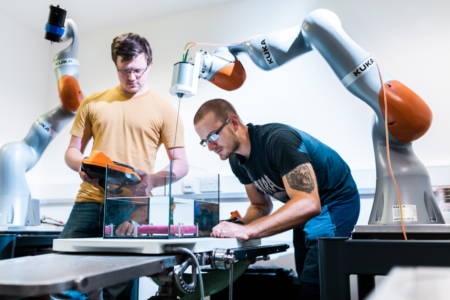For aspiring chemists, the dream is to join the ranks of scientific figures like Marie Curie, Robert Bunsen, and Carolyn Ruth Bertozzi. These pioneers paved the way for modern science, and many students today hope to follow in their footsteps. But how does one achieve such heights? It begins with choosing the right educational institution — one that offers expert faculty, state-of-the-art labs, ample research opportunities, and a rigorous curriculum. Graduates from such programmes often excel in diverse fields, from forensics to pharmaceuticals.
One such institution is University College London (UCL), renowned for its Chemistry Department. Ranked as the second-best in the UK for impactful research, the department has over 50 members of academic staff who are engaged in world-leading research. The department specialises in various fields, including organic synthesis, chemical biology, computational chemistry, nanotechnology, inorganic and materials chemistry, physical chemistry, and chemical physics.

University College London’s Chemistry Department offers specialised postgraduate chemistry degrees with bespoke teaching and world-leading research. Source: University College London
Prospects-enhancing postgraduate programmes
The department offers six Master of Science degrees, five of which have already been accredited by the Royal Society of Chemistry. These include the MSc Applied Analytical Chemistry, MSc Chemical Research, MSc Materials for Energy and Environment, MSc Materials and Molecular Modelling, and MSc Organic Chemistry: Drug Discovery.
A recent addition to the department’s portfolio is the MSc Chemical Sustainability, a programme that focuses on Sustainable Chemistry, Green Chemistry, and Sustainable Technologies for Chemical Synthesis.
Although the programme is new, it is already generating excitement among students and industry. The programme is based at the new Manufacturing Futures Lab (MFL) on UCL’s East Campus, located in the heart of the Queen Elizabeth Olympic Park. The MFL is a cutting-edge, multi-departmental facility dedicated to developing new strategic research focused on knowledge-based manufacturing. The goal is to deliver sustainable products and processes of the future, using technologies such as 3D printing, synthetic biology, biocatalysis, and intensified processing to create more cost-effective, efficient, and sustainable solutions.
“What inspires me the most is the transformative power of chemistry to make a tangible, positive impact on the world,” says student Anita Yan. “As part of my research programme, I am upcycling plastic into a catalyst and applying this catalyst in a reaction to generate biofuel precursors. Thanks to my supervisor, I have had everything I needed for this project, and he has always been incredibly helpful.”
The one-year, full-time MSc in Chemical Sustainability is specifically developed in response to the growing demand from the chemical and pharmaceutical industries for highly qualified scientists with interdisciplinary knowledge in chemical sustainability and green chemistry. These experts are essential for addressing the global challenges of today and tomorrow, such as energy and climate change, pollution in chemicals and materials manufacturing, clean water, and plastic recycling.

The Chemistry Department at University College London has over 60 academic staff who conduct world-class research. Source: University College London
Another standout programme is the MSc in Applied Analytical Chemistry. Analytical chemistry plays a crucial role in various industries, from jet engine development to food production, and is applied in academic disciplines such as Earth sciences, medicine, archaeology, pharmacy, and forensics. This MSc programme trains the next generation of analytical scientists, equipping them with state-of-the-art methods and skills to tackle the challenges across these diverse applications.
What sets this programme apart is that it is highly applied. It provides a strong grounding in theory and techniques while focusing on real-world problem-solving, hands-on experience, case studies, and the development and use of analytical devices. Just ask Andreas Pantelis, a current student of MSc Applied Analytical Chemistry.
“Throughout the year, I had the opportunity to apply all the analytical techniques I learned as an undergraduate student, including NMR, LC-MS, GC, MP-AES, HPLC, and IR, and gain hands-on experience,” he says. “I also learned how Analytical Chemistry is applied in the real world, with the most memorable example being the ‘Approaches to Laboratory Diagnosis of Infection’ module, where I was part of a team that developed a novel diagnostic device for Salmonella.”
The emphasis on practical application is evident as students design and build Arduino/Raspberry Pi-based analytical devices, using them to answer real-world questions. The programme’s teaching techniques align with its applied nature, incorporating problem-based learning, case studies, self-study, and group work. Strong industry links ensure the course remains relevant, producing graduates who are highly employable and well-prepared for the job market.
No matter which programme students choose, they benefit from extensive hands-on research, making it an ideal stepping stone toward a PhD. Plus, throughout their studies, they will receive ample support from a large network of postgraduate tutors, research supervisors, personal tutors, and student advisors.
The best part? Students get to study in the heart of Central London, where they can enjoy all the opportunities and experiences that the energetic capital has to offer. “Studying in London gives me a privilege,” Yan says. “Almost everything you can think of can be found in London. This vibrant environment keeps me in a good mood and motivated when facing obstacles in my course.”
Learn more about the UCL Chemistry Department.
Follow University College London on Facebook, X, Instagram, and YouTube












